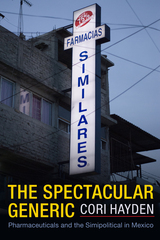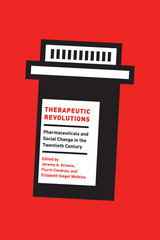3 books about Pharmaceuticals

A Pill for Promiscuity
Gay Sex in an Age of Pharmaceuticals
Andrew R. Spieldenner
Rutgers University Press, 2023
For a generation of gay men who came of age in the 1980s and 1990s, becoming sexually active meant confronting the dangers of catching and transmitting HIV. In the 21st century, however, the development of viral suppression treatments and preventative pills such as PrEP and nPEP has massively reduced the risk of acquiring HIV. Yet some of the stigma around gay male promiscuity and bareback sex has remained, inhibiting open dialogues about sexual desire, risk, and pleasure.
A Pill for Promiscuity brings together academics, artists, and activists—from different generations, countries, ethnic backgrounds, and HIV statuses—to reflect on how gay sex has changed in a post-PrEP era. Some offer personal perspectives on the value of promiscuity and the sexual communities it fosters, while others critique unequal access to PrEP and the increased role Big Pharma now plays in gay life. With a diverse group of contributors that includes novelist Andrew Holleran, trans scholar Lore/tta LeMaster, cartoonist Steve MacIsaac, and pornographic film director Mister Pam, this book asks provocative questions about how we might reimagine queer sex and sexuality in the 21st century.
A Pill for Promiscuity brings together academics, artists, and activists—from different generations, countries, ethnic backgrounds, and HIV statuses—to reflect on how gay sex has changed in a post-PrEP era. Some offer personal perspectives on the value of promiscuity and the sexual communities it fosters, while others critique unequal access to PrEP and the increased role Big Pharma now plays in gay life. With a diverse group of contributors that includes novelist Andrew Holleran, trans scholar Lore/tta LeMaster, cartoonist Steve MacIsaac, and pornographic film director Mister Pam, this book asks provocative questions about how we might reimagine queer sex and sexuality in the 21st century.
[more]

The Spectacular Generic
Pharmaceuticals and the Simipolitical in Mexico
Cori Hayden
Duke University Press, 2023
In The Spectacular Generic, Cori Hayden examines how generic drugs have transformed public health politics and everyday experiences of pharmaceutical consumption in Latin America. Focusing on the Mexican pharmacy chain Farmacias Similares and its proprietor, Víctor González Torres, Hayden shows how generics have become potent commodities in a postpatent world. In the early 2000s, González Torres, a.k.a. “Dr. Simi,” capitalized on the creation of new markets for generic medicines, selling cheaper copies of leading-brand drugs across Latin America. But Dr. Simi has not simply competed with the transnationals; his enterprise has also come to compete with the Mexican state, reorganizing the provision of medicine and basic health care for millions of people. Hayden juxtaposes this story with Dr. Simi’s less successful efforts in Argentina, where he confronted a radically different configuration of pharmaceutical politics. Building from these diverging trajectories, Hayden illuminates the politics of generic substitution as a question that goes beyond substituting one drug for another. Generic politics can radically reshape the relations among consumers, states, and pharmaceutical markets, even as they have yet to resolve the problems of cost and access.
[more]

Therapeutic Revolutions
Pharmaceuticals and Social Change in the Twentieth Century
Edited by Jeremy A. Greene, Flurin Condrau, and Elizabeth Siegel Watkins
University of Chicago Press, 2016
When asked to compare the practice of medicine today to that of a hundred years ago, most people will respond with a story of therapeutic revolution: Back then we had few effective remedies, but now we have more (and more powerful) tools to fight disease, from antibiotics to psychotropics to steroids to anticancer agents.
This collection challenges the historical accuracy of this revolutionary narrative and offers instead a more nuanced account of the process of therapeutic innovation and the relationships between the development of medicines and social change. These assembled histories and ethnographies span three continents and use the lived experiences of physicians and patients, consumers and providers, and marketers and regulators to reveal the tensions between universal claims of therapeutic knowledge and the actual ways these claims have been used and understood in specific sites, from postwar West Germany pharmacies to twenty-first century Nigerian street markets. By asking us to rethink a story we thought we knew, Therapeutic Revolutions offers invaluable insights to historians, anthropologists, and social scientists of medicine.
This collection challenges the historical accuracy of this revolutionary narrative and offers instead a more nuanced account of the process of therapeutic innovation and the relationships between the development of medicines and social change. These assembled histories and ethnographies span three continents and use the lived experiences of physicians and patients, consumers and providers, and marketers and regulators to reveal the tensions between universal claims of therapeutic knowledge and the actual ways these claims have been used and understood in specific sites, from postwar West Germany pharmacies to twenty-first century Nigerian street markets. By asking us to rethink a story we thought we knew, Therapeutic Revolutions offers invaluable insights to historians, anthropologists, and social scientists of medicine.
[more]
READERS
Browse our collection.
PUBLISHERS
See BiblioVault's publisher services.
STUDENT SERVICES
Files for college accessibility offices.
UChicago Accessibility Resources
home | accessibility | search | about | contact us
BiblioVault ® 2001 - 2024
The University of Chicago Press









